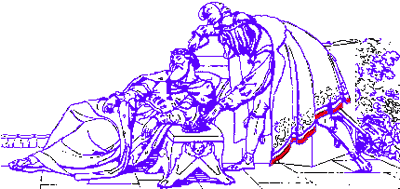![]()
Which Speech?
| You shall see anon how the murderer gets the love of Gonzago's wife. (III,ii,248-9) |

Despite the prologue and dumb show, the moment when Claudius rises coincides with the moment when Lucianus enacts the pouring of poison into the player king's ear. This action is accompanied both by Lucianus' speech and then by the running commentary that Hamlet provides. For John Dover Wilson, it is the speech itself that triggers the king's reaction. He concludes that these are the lines that Hamlet has written for the First Player (whom he has coached), and that these lines are closely based on the ghost's account of the murder.
|
Thoughts black, hands apt, drugs fit, and time agreeing The "Secure hour", the foul nature of the
drug, its swift effect upon the "wholesome" body: all are
the same. These considerations, taken in conjunction with our unmasking
of the First Player, should leave no doubt upon the matter.
--Wilson. p. 163 |
For Wilson, there is no question what is being revealed here
to Claudius. In an instant he is aware that Hamlet knows his guilty secret.
| Murder, wife! wife, murderer! second husband, poison! The thing is clear.
The plot of the interlude is his life's history. HAMLET KNOWS ALL! Claudius
is not safe; Anything may happen. He pulls himself to his feet, and, squealing
for light, he totters as fast as his trembling knees will carry him from
the terrible, the threatening room. King Mouse has become a shambling,
blinking paddock. - Wilson. p.195. |
Wilson's certainty in reading these events raises a variety of questions that deserve further consideration. The first has to do with the very fact that The Murder of Gonzago happens to be in the traveling company's repertory.
When you consider that for a company to have a play ready for performance on one day's notice, you have to take into account that the parts must be memorized, the costumes must be prepared; props and set pieces must all be packed in the limited trunk space available to the troupe. As previously stated, The Murder of Gonzago, fits the model of the Italianate revenge plays that were popular in England at the end of the 17th Century. It follows that it was not only a popular play, but one that was sufficiently popular for the company to have it among their limited number of offerings. Furthermore, Hamlet is familiar with the play, as are the members of the company. We assume that he became acquainted with it abroad since it seems unknown to other members of the court, including Claudius.
Another possibility surfaces. Let us assume that the fact that the circumstances of the crime in The Murder of Gonzago resemble the events described by the ghost is not coincidental, but that Claudius, who is also likely to be well traveled, was also familiar with the play. Indeed, he may have gotten the idea for the murder from the drama itself. Needless to say, if this were the case, he would protest his unfamiliarity with the play - loudly proclaiming that he had not previously heard of it, as he does in the scene.
Given this circumstance, Claudius' unspoken reaction to the choice of plays would be one of suspicion; but suspicion moderated with the comforting thought that the drama is, after all, popular, and its selection could be coincidental. In effect, he could live with his discomfort, keeping his suspicions under wraps until such time as they are unquestionably confirmed.
Here, the role of the inserted speech becomes important. "Thoughts black, hands apt, drugs fit, and time agreeing,..." Being already familiar with the play, Claudius recognizes at this point that the drama has been tampered with. The language of the inserted speech is particularly accusatory, and further serves to vilify the villain. Suspicions that might have been discounted as coincidence are confirmed at this point.
Such an explanation is the product of speculation, but informed
speculation. It's virtue lies in the fact that it answers some persistent
questions. It answers how it is that Claudius waits as long as he does before
reacting, why he rises at the particular moment when he does, how it is that
Hamlet knows the play in advance, and that the company has it in its limited
repertory, and possibly even suggests where Claudius got the idea for the
method of poisoning the king in the first place. There are, however, other
questions that still need answering.